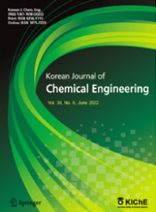Articles & Issues
- Language
- English
- Conflict of Interest
- In relation to this article, we declare that there is no conflict of interest.
- Publication history
-
Received August 16, 2022
Accepted November 6, 2022
-
 This is an Open-Access article distributed under the terms of the Creative Commons Attribution Non-Commercial License (http://creativecommons.org/licenses/bync/3.0) which permits
unrestricted non-commercial use, distribution, and reproduction in any medium, provided the original work is properly cited.
This is an Open-Access article distributed under the terms of the Creative Commons Attribution Non-Commercial License (http://creativecommons.org/licenses/bync/3.0) which permits
unrestricted non-commercial use, distribution, and reproduction in any medium, provided the original work is properly cited.
Copyright © KIChE. All rights reserved.
All issues
Investigation of reduced lithium titanate spinel as insertion host for rechargeable batteries
Korean Journal of Chemical Engineering, March 2023, 40(3),
10.1007/s11814-022-1333-7
10.1007/s11814-022-1333-7
 Download PDF
Download PDF
Abstract
Rechargeable batteries based on reversible zinc electrodeposition in mildly acidic electrolytes have recently gained popularity, primarily because of their cost-benefit and high theoretical energy density achievable. However, issues associated with dendrite growth and the corrosion of zinc metal anodes still remain major technical roadblocks that must be overcome to ensure battery safety. Here we propose, for the first time, reduced lithium titanate (LTO) as a viable alternative anode that is capable of reversible ion intercalation at ~0.20 V vs. Zn/Zn2+. Reduced LTO was prepared via simple thermochemical reduction at a mild temperature using sodium borohydride. This led to a significant reduction in the crystallite size and a drastic enhancement in the electrical conductivity, resulting in a distinct enhancement in the zinc insertion kinetics in the aqueous electrolytes, delivering a fair discharge capacity of 100mAh g?1. Structural and morphological studies confirmed that reduced LTO served as a zero-strain host for ionic intercalation. This study offers an interesting approach for developing novel intercalation hosts for rechargeable batteries based on abundant multivalent metal cations.

